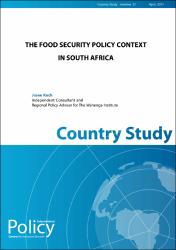Please use this identifier to cite or link to this item:
https://repositorio.ipea.gov.br/handle/11058/15804Files in This Item:
| File | Description | Size | Format | |
|---|---|---|---|---|
| en_IPCCountryStudy21.pdf | 331.02 kB | Adobe PDF |  View/Open |
| Title: | The Food Security Policy Context in South Africa |
| Authors: | Koch, Josee |
| Abstract: | South Africa is unlikely to feature at the top of the agenda at any international dialogue on food security. The country is a net exporter of agricultural commodities and has a high per capita income, even for an emerging economy. There are no tight foreign-exchange constraints, and the country is not landlocked. The innovative constitution entrenches the right to adequate nutrition, and this is the basis of the national Integrated Food Security Strategy (IFSS). Taking these features into account, one could easily conclude that food ought to be available and accessible in South Africa at all times. But is this conclusion correct? The confusing reality is that despite all the favourable indicators and South Africa’s national “food-secure” status, about 14 per cent of the population is estimated to be vulnerable to food insecurity, and 25 per cent of children under the age of six are reckoned to have had their development stunted by malnutrition (HSRC, 2004). (...) |
| metadata.dc.rights.holder: | International Policy Centre for Inclusive Growth United Nations Development Programme |
| metadata.dc.rights.license: | O texto e dados desta publicação podem ser reproduzidos desde que as fontes sejam citadas. Reproduções com fins comerciais são proibidas. |
| metadata.dc.type: | Research Report |
| Appears in Collections: | Publicações do IPC-IG |
Items in DSpace are protected by copyright, with all rights reserved, unless otherwise indicated.

